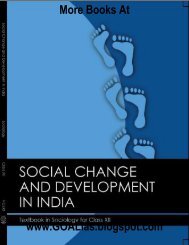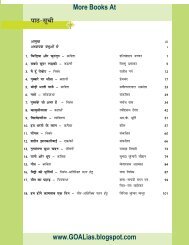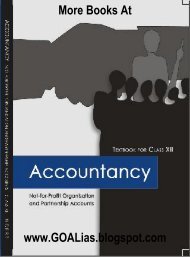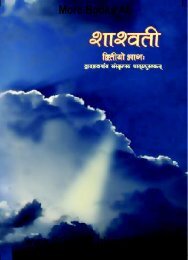t.com www.GOALias.blogspot.com www.GOALias.blogspot.com
t.com www.GOALias.blogspot.com www.GOALias.blogspot.com
t.com www.GOALias.blogspot.com www.GOALias.blogspot.com
- No tags were found...
Create successful ePaper yourself
Turn your PDF publications into a flip-book with our unique Google optimized e-Paper software.
<strong>www</strong>.<strong>GOALias</strong>.<strong>blogspot</strong>.<strong>com</strong>182Politics in India since IndependenceThe Mandal CommissionReservations for the OBC were in existence in southern States since the 1960s,if not earlier. But this policy was not operative in north Indian States. It wasduring the tenure of Janata Party government in 1977-79 that the demand forreservations for backward castes in north India and at the national level wasstrongly raised. Karpoori Thakur, the then Chief Minister of Bihar, was a pioneerin this direction. His government had introduced a new policy of reservations forOBCs in Bihar. Following this, the central government appointed a Commissionin 1978 to look into and re<strong>com</strong>mend ways to improve the conditions of thebackward classes. This was the second time since Independence that thegovernment had appointed such a <strong>com</strong>mission. Therefore, this <strong>com</strong>missionwas officially known as the Second Backward Classes Commission. Popularly,the <strong>com</strong>mission is known as the Mandal Commission, after the name of itsChairperson, Bindeshwari Prasad Mandal.B.P. Mandal(1918-1982): M.P. fromBihar for 1967-1970and 1977-1979; chairedthe Second BackwardClasses Commissionthat re<strong>com</strong>mendedreservations for OtherBackward Classes; asocialist leader from Bihar;Chief Minister of Bihar forjust a month and a half in1968; joined the JanataParty in 1977.The Mandal Commission was set up toinvestigate the extent of educational and socialbackwardness among various sections of Indiansociety and re<strong>com</strong>mend ways of identifying these‘backward classes’. It was also expected to giveits re<strong>com</strong>mendations on the ways in which thisbackwardness could be ended. The Commissiongave its re<strong>com</strong>mendations in 1980. By then theJanata government had fallen. The Commissionadvised that ‘backward classes’ should be understoodto mean ‘backward castes’, since many castes,other than the Scheduled Castes, were also treatedas low in the caste hierarchy. The Commission dida survey and found that these backward castes hada very low presence in both educational institutionsand in employment in public services. It thereforere<strong>com</strong>mended reserving 27 per cent of seats ineducational institutions and government jobs forthese groups. The Mandal Commission also mademany other re<strong>com</strong>mendations, like, land reform, toimprove the conditions of the OBCs.In August 1990, the National Front governmentdecided to implement one of the re<strong>com</strong>mendationsof Mandal Commission pertaining to reservationsfor OBCs in jobs in the central government and itsundertakings. This decision sparked agitations andviolent protests in many cities of north India. Thedecision was also challenged in the Supreme Court and came to be knownas the ‘Indira Sawhney case’, after the name of one of the petitioners. InNovember 1992, the Supreme Court gave a ruling upholding the decision ofthe government. There were some differences among political parties aboutthe manner of implementation of this decision. But now the policy of reservationfor OBCs has support of all the major political parties of the country.
















